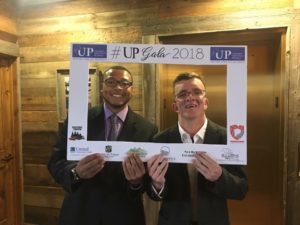WCU’s University Participant program gives students with intellectual disabilities the opportunity they’ve been waiting for.
In 2007, program Co-Director Kelly Kelley questioned her then special education graduate professor, Dr. Westling, what WCU could be doing about inclusion on campus. Westling challenged his students to conceive a program that could do such a thing, and in 2007, it began its pilot run, co-directed by Kelley and Westling.
Hear the audio story about the program, edited and produced by Elise Holbrook.
Believing that the valuable skills taught through the program can’t be learned in isolation, the program has kept inclusion at its core from the very beginning. But that goal doesn’t come easily. The program was initially funded through a $2.5 million grant from the U.S. Department of Education in 2010, providing a large budget and the ability to keep a five-person staff to assist students.
Since the grant ended in 2015, the operating budget for the program has been fairly minimal, and now it almost solely relies on donations and borrowing, reducing its office down to a few full-time positions, and using student volunteers to help with scheduling and academics among other things.
To help fill the funding gap, the program hosted its first-ever fundraising gala on April 7 at Laurel Ridge Country Club in Waynesville, NC, to help continue offering the number and quality of services they currently provide. Because UP students pay similar tuition and fees to a student living in Scott Hall (averaging about $18,000), in addition to UP program fees, it is also a hope that the money raised by the gala can help some families with the financial concern that college may pose.
To learn more about the UP gala click here.

Cody Thompson, 2017 UP graduate (left), and Current UP student Samuel Garrison (right) at the UP gala on April 7. Photo provided by Kelly Kelley.
The difference the program has made, and the significance it holds on campus, is clear in the passion volunteers have. The impact of the program is even more evident when you speak to the students themselves. UP student Sam Garrison has been deeply impacted by the program.
“I guess it’s allowed me to feel confident and feel like I can do stuff, not that I don’t need help, but just like, that I have the ability to be independent and be the person that I am meant to be,” Garrison said.
Student Arley Andrews has also seen a difference, noticing her own growth.

Alejandra Cespedes, Communication Sciences and Disorders major and UP volunteer (left), and UP student Arley Andrews (right) at the UP Gala on April 7. Photo provided by Kelly Kelley.
“It has helped me grow because I’ve seen myself graduate high school, then come to college and I feel like I’m really making a change and a difference in college,” Andrews said.
As the program continues to evolve, Kelley hopes that they can build upon the residential nature of the program, expanding it from a two year to four-year option, to further include students in the progression of college to community life.


